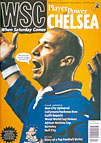 A guest editorial from Colin Moneypenny, secretary of the Merseyside branch of the Football Supporters Association
A guest editorial from Colin Moneypenny, secretary of the Merseyside branch of the Football Supporters Association
Lord Justice Stuart-Smith’s scrutiny of new evidence relating to the Hillsborough disaster has lead him to conclude that there was insufficient reason to reopen the inquest. Anyone involved in the aftermath of Hillsborough had their suspicions that this would happen but many of the bereaved families were still astonished when Jack Straw made his announcement to the Commons, in the process not just denying a further inquiry but seemingly preventing any further investigation whatsoever into the events of April 15th 1989.
The Home Secretary made soothing noises to the families and urged them to read the 22-page document – unlike South Yorkshire Police they were not given prior access to it – before passing their own verdict on his decision. Several weeks on, their astonishment has turned to anger that a government elected on promises of social justice has used this opportunity to reinforce its ‘establishment’ credentials.
Essentially the report is a Warren Commission for the Nineties. Lord Stuart-Smith struts through the many arguments presented by the families relating to issues such as the failure of the emergency response, the changing of police statements and the ‘new’ video and medical evidence and slams the door firmly shut on each one.
It ought to be stressed that the families can’t be accused of complaining just because the findings of a judge went against them. Their reservations about the appointment of this particular judge, his very restricted terms of reference, the lack of information forthcoming from South Yorkshire Police and indeed why there was a need for the unprecedented halfway house of a scrutiny, as opposed to a full inquiry, were placed on record months ago; no action was taken by the Home Secretary on any of these counts.
Of these criticisms the terms of reference provoke the clearest concern. Stuart-Smith was instructed only to look at “fresh evidence”, when much of the injustice surrounding Hillsborough lies in the way the judicial system skirted over, ignored or distorted the mass of evidence which was already in existence.
Reassurances that the police disciplinary procedures and the inquiry/inquest system, as well as the rules governing compensation, will change as a result of Hillsborough are small comfort to families still disgusted that the word “accident” appears on 96 death certificates. A legal system which, as Stuart-Smith reiterates, allows a verdict of accidental death to cover circumstances involving gross neglect and incompetence is one which few can place much faith in.
The local councils on Merseyside, led by Liverpool City Council’s long-established Hillsborough working party, have been unanimous in distancing themselves from the decision, while local MPs are under pressure to declare their support either for the Home Secretary or the families. As the political implications grow – the secretary of the Family Support Group wants to challenge Home Office minister George Howarth for his Knowsley North seat – there are attempts to find some common ground. Jack Straw has held a brief meeting with the families to discuss their concerns and he has promised to visit Liverpool soon for a longer meeting.
If nothing further is forthcoming, the options which the families may continue to examine include the quashing of the original inquest finding in order to effectively leave an open verdict, an investigation into the tampering with police evidence which has emerged and a limited inquiry into the response of the emergency services after 3.15 (the cutoff time on the day after which the coroner would hear no further evidence).
Most of all, though, they may choose to take up the small piece in the scrutiny which, although Stuart-Smith denies it, suggests there is some evidence not available to Lord Taylor which may aid a private prosecution against Sheffield Wednesday and possibly Sheffield City Council as those responsible for the licensing of the stadium. It is an option which many Liverpool supporters would find easy to back, in the light of Wednesday’s continuing snub to the suggestion of a memorial at the stadium and their appalling decision to allow the Sun to sponsor Liverpool’s recent Premiership fixture there.
Of course this campaign is not just about Liverpool supporters, or even supporters in general. Now is the time for football people to take a break from counting the money – ironically generated through the changes which followed Hillsborough – and finally lend some support to the families bereaved by the game’s biggest disaster.
Forty-five thousand Liverpool and Everton fans chanting “Justice” at the recent derby match showed the way even if Sky, for the second time, ducked out of coverage of the event, in favour of a game of table football between Andy Gray and Ian Rush. If any supporter, journalist, pundit or indeed member of the Task Force can think of an issue in football that is more important than finally providing justice for the 96 dead and their families, then perhaps they could drop a line to Trevor Hicks to explain why.
From WSC 134 April 1998. What was happening this month